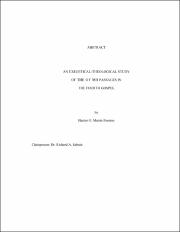| dc.description.abstract | Although grammarians have noted the phenomenon of the emphatic denial ouj mh; (ED) in the Fourth Gospel, a survey of the standard critical commentaries on the Gospel of John reveals that there is scanty work about its theological function. The review also shows that there is a lack of treatment about the implications of the ED in the Fourth Gospel, in particular in the soteriological sayings of Jesus and other negative statements.
The subject of the theological function and the implications of the ED in the Fourth Gospel deserve attention because first, a soteriological theme is frequently associated with the construction; and second, at present, the few works that deal with the subject have done it in a general way. Therefore, a more systematic and comprehensive treatment is needed.
The exegesis of the 16 passages in the Fourth Gospel (John 4:14, 48; 6:35, 37; 8:12, 51, 52; 10:5, 28; 11:26; 13:8, 38; 18:11) reveals first, that the ED in the soteriological
sayings of Jesus points to Him as the fulfillment of OT messianic expectations, His divine status, and the nature of His messiahship. The ED highlights the mission of Jesus as one of spiritual character. Second, in the soteriological sayings of Jesus it points to an emphasis on a present inaugurated eschatology in His person. In Jesus, the eschatological future is now present. He, in His ministry, inaugurates eternal life. Third, in the context of other negative statements, the ED would indicate the author’s intention to highlight that humanity is in need. The elements of obstinacy in accepting Jesus’ status, false expectation regarding Him, the lack of understanding about His mission-service even at the point of death, and the human tendency to trust in a faith based on the perceptible rather than in God’s Word, are parts of human nature. The human being is in need of spiritual discernment to appreciate heavenly perspectives. Fourth, the ED contributes to the overall purpose of the Fourth Gospel as stated in John 20:30, 31. The ED, used as a literary device in combination with other literary conventions, adds prominence to the authoritative pronouncements of Jesus, and calls the attention of the reader/hearer to the significance of Jesus’ statements. In this sense, this is very much in keeping with John’s purpose for writing his gospel as reflected in John 20:31. | en_US |

